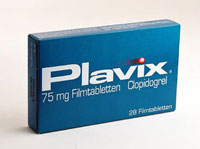Halting Plavix may cause heart attack and death
By Margarita Snegireva. U.S. researchers found out that patients who were given the blood-clot preventer Plavix after a heart attack or after receiving a stent have a far higher risk of heart attack or death in the three months after they stop taking the drug.

They found a cluster of heart problems occurring within 90 days of stopping the drug in people whose heart disease was treated either with drugs or a stent to prop open their arteries.
Clopidogrel is a potent oral antiplatelet agent often used in the treatment of coronary artery disease, peripheral vascular disease, and cerebrovascular disease. It is marketed by Bristol-Myers Squibb and Sanofi-Aventis under the trade name Plavix. It works by blocking a receptor called P2Y12. Adverse effects include hemorrhage.
The mechanism of action of clopidogrel is irreversible blockade of the adenosine diphosphate (ADP) receptor on platelet cell membranes. This receptor is named P2Y12 and is important in platelet aggregation, the cross-linking of platelets by fibrin. The blockade of this receptor inhibits platelet aggregation by blocking activation of the glycoprotein IIb/IIIa pathway.
Platelet inhibition can be demonstrated two hours after a single dose of oral clopidogrel, but the onset of action is slow, so that a loading-dose of 300-600 mg is usually administered.
Subscribe to Pravda.Ru Telegram channel, Facebook, RSS!


